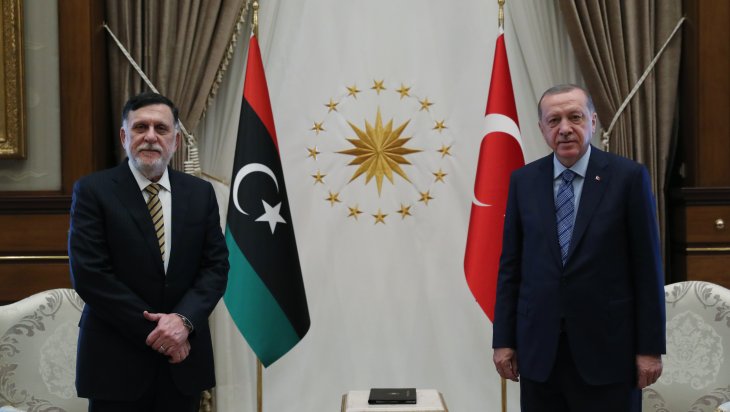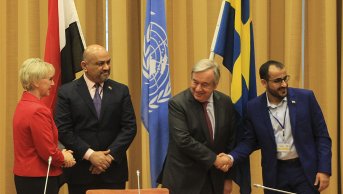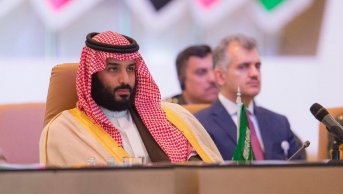What is the Use of Military Interventions in the MENA Region?

* Mohammed Alragawi
The recent developments in Libya show a huge loss for the warlord Khalifa Haftar, as the Government of National Accord (GNA) forces took the Watiya airbase, their biggest advance in a year, and hundreds of Russian mercenaries were evacuated from combat zones south of Tripoli.
Despite the support the Libyan National Army (LNA) is getting from the United Arab Emirates (UAE) Saudi Arabia, Egypt and Russia, the Tripoli-based and UN-recognized GNA has achieved its latest successful advances with the support of Turkey. Turkey has lately warned the LNA forces that any attacks on its interests in Libya will have "very grave consequences".
Pro-GNA forces claimed that seven cargo planes had landed in Tripoli to evacuate hundreds of Russian mercenaries from the front lines to Bani Walid, a city 150km southeast of Tripoli. And regardless of the LNA spokesman’s denial of any foreigners fighting within its forces, a leaked United Nations report confirms that Russian private military contractor Wagner Group deployed about 1,200 mercenaries sent earlier to strengthen Haftar's forces. Also, the report identified more than two dozen flights between Russia and eastern Libya from August 2018 to August 2019.
The Turkey-Libya Maritime Boundary Delimitation Agreement signed by Turkish President Recep Tayyip Erdogan and Chairman of the Presidential Council of Libya Fayiz es-Sarraj on November 27, 2019, started to bear fruits as Turkish drones and air defenses appear to have played a key role in GNA advances in recent weeks and changed the balance of power in Libya.
Destabilizing actor in the region
Looking into the UAE’s role in the region, the UAE has become a destabilizing actor as it provides financial and military support to coup leaders in Egypt, Libya, and Yemen. As in Libya, the UAE has sent hundreds of military cargo planes and thousands of military supporting materials to Haftar militias. According to the report of the Stockholm International Peace Research Institute (SIPRI) covering the years of 2015-2019, the UAE became one of the leading countries in the transfer of arms and equipment to Haftar. The report stated that the UAE, which provided Haftar forces with a large number of armed unmanned aerial vehicles, also bought combat helicopters from Belarus and transferred them to the Haftar militias in Libya.
The report also stated that UAE was the eighth-largest arms importer in the world in 2015–19, in which two-thirds of its arms imports came from the USA. In 2019, when foreign military involvement in Libya was condemned by the United Nations Security Council, the UAE had major arms import deals ongoing with Australia, Brazil, Canada, China, France, Russia, South Africa, Spain, Sweden, Turkey, the UK, and the USA.
Likewise, The UAE is dragging Yemen into more a chaotic situation. Since its first involvement in Yemen in March 2015 as the second major actor in the Saudi-led coalition, the UAE has been financing and training armed groups in the south where it has established strong military bases and trained thousands of fighters such as the Security Belt Forces and the Shabwani and Hadrami Elite Forces.
More blatantly, the UAE-supported separatist group known as the Southern Transition Council (STC) has announced its self-rule administration in south governorates. The STC’s unilateral decision was strongly rejected by the Yemeni government which considered the decision as an attempt to “divide the country and threaten its stability”. Months earlier to that announcement, UAE has carried out airstrikes to support the separatist STC’s forces that seized the Presidential Palace and public institutions in Aden. UAE airstrikes killed and injured more than 300 army members and civilians. Moreover, the legitimate government repeatedly accuses UAE of attempting to seize Yemen's Socotra island which is mainly still under the UAE’s control.
Turkey vs UAE interventions
Turkey's intervention in Libya shows a good example of real friendship and alliance between two countries, especially in times of need. Without a doubt, Ankara's military intervention in Libya has changed the war balance in Libya in favor of the legitimate and UN-recognized GNA and opened broad discussions on Turkey’s rising influence in the region and its effective military and diplomatic relations. On the other hand, Saudi Arabia and UAE's intervention in Yemen is just an opposite example of an influence abroad any country can make. The Saudi-led coalition in Yemen has weakened the legitimate government and fully destroyed Yemen's infrastructures causing the worst humanitarian crisis in recent history.
While Turkey's intervention in Libya is trying to prevent a military coup and restore peace, the UAE’s intervention in Yemen created another coup in the south in addition to the Houthi coup in the north. Recent developments in Libya has shown Turkey’s firm commitments to support its ally on the ground, however, the deteriorating situation in Yemen reveals the UAE’s hidden agenda to divide and destabilize the country.
Just months after Turkey’s intervention in Libya, the GNA has achieved huge advances on the ground, whereas throughout the ongoing six years of the UAE’s intervention in Yemen, the legitimate government kept losing power and support from local and international entities, leading the country into an unknown future.
Another successful intervention of Turkey was in Qatar where Saudi Arabia and the UAE planned a military intervention against Qatar, but the plan failed when Turkey sent troops to restore peace in the region. More obviously, Turkey’s intervention in Syria and its three major successful military operations, the 'Peace Spring' in 2019, 'Olive Branch' in 2018, and 'Euphrates Shield' in 2016-2017, are further evidence on the list of Turkey’s successful military interventions in the region.
Turkey’s quick and strong military responses to Syria, Qatar, and Libya demonstrates not only its solidarity to these countries, but also shows Turkey’s important role in preserving peace and supporting democracy in the region. All these examples of Turkey’s successful interventions provide the answer to the question raised at the title of this article, (but leave us wondering), ‘When’ and ‘How’ should Turkey intervene in Yemen?!”
*Yemeni journalist









